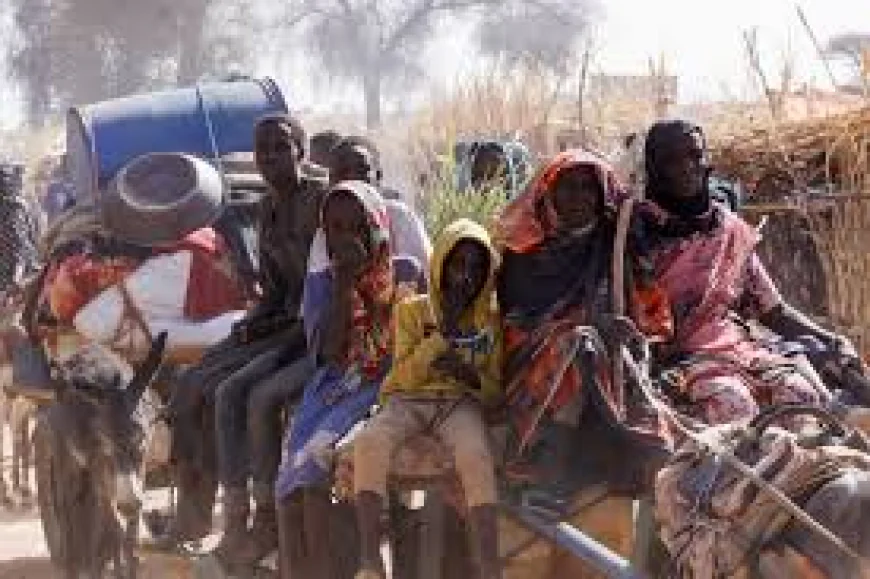Sudan Civil War 2025: RSF Capture, Famine, and the Collapse of Darfur
Sudan’s war has reached a devastating turning point. The paramilitary Rapid Support Forces (RSF) have seized control of al-Fashir, the last major city in Darfur still held by the army, triggering famine, mass killings, and an exodus of civilians. As the conflict enters its second year, the world faces what aid groups call “a humanitarian catastrophe of unimaginable proportions.”

Famine, Mass Killings, and a Broken Nation: Sudan’s Civil War Deepens in Darfur
Eighteen months after fighting erupted between Sudan’s rival military factions, the war has spiraled into one of the world’s worst humanitarian crises. The paramilitary Rapid Support Forces (RSF) have taken al-Fashir, the final stronghold of the Sudanese Armed Forces (SAF) in Darfur, marking a major power shift and leaving millions trapped in famine and fear. The United Nations and humanitarian organizations warn that Sudan is collapsing before the world’s eyes.
The Fall of al-Fashir: A Nation Divided
According to Reuters, RSF fighters captured al-Fashir in late October after a brutal siege that left much of the city in ruins. The fall of al-Fashir effectively gives the RSF control of nearly all of Darfur; a vast western region roughly the size of France, and sets the stage for Sudan’s de facto partition.
The Sudanese Armed Forces, led by General Abdel Fattah al-Burhan, now hold sway mostly in the country’s east, while RSF commander Mohamed Hamdan Dagalo, known as Hemedti, controls the west. Analysts warn that this division could cement a permanent split between rival power blocs, prolonging instability in Africa’s third-largest nation.
Residents described scenes of terror as RSF troops entered the city: “Men were dragged from their homes and shot in the streets,” one survivor told Reuters by phone. “No one is safe, not even the wounded in hospitals.”
Famine Takes Hold
The humanitarian toll is staggering. The Integrated Food Security Phase Classification (IPC) confirmed famine in al-Fashir and Kadugli, making them the first urban centers in Sudan’s war to face famine conditions. Aid agencies report that families are surviving on animal feed and tree bark.
According to the United Nations, over 4 million Sudanese have fled the country since the conflict began, while an estimated 8 million more are internally displaced. With humanitarian access blocked and aid convoys attacked, millions are trapped in war zones with no food, medicine, or shelter.
“The situation is apocalyptic,” said Robert Mardini, Director-General of the International Committee of the Red Cross (ICRC). “History is repeating itself in Darfur, we are witnessing atrocities reminiscent of the early 2000s.”
Mass Killings and Atrocities
Reports gathered by Reuters and human rights investigators suggest that hundreds of men were executed or disappeared following the RSF’s capture of al-Fashir. Witnesses described mass graves and forced abductions. The International Criminal Court (ICC) has since opened a preliminary investigation into possible war crimes, including systematic killings, rape, and ethnic targeting.
Five Red Cross volunteers were killed while distributing food in North Kordofan, and humanitarian organizations continue to face harassment and attacks. Hospitals have been looted, with medical staff fleeing or hiding underground.
One local doctor told reporters that bodies “littered the streets” as snipers fired indiscriminately: “We could not even bury the dead. The smell of death fills the air.”
A Humanitarian Collapse Without Borders
Sudan’s conflict has triggered a regional crisis stretching from Chad to South Sudan and Egypt. Refugee camps are overflowing, while neighboring countries struggle to contain the influx of displaced families. Aid groups warn that famine and disease could soon claim more lives than the war itself.
With trade routes and gold mines now under RSF control, experts fear the paramilitary group could fund a long-term insurgency. “Sudan is effectively fractured,” one regional analyst told Al Jazeera. “We’re watching the state collapse in real time.”
Why the World Should Care
Sudan’s implosion risks destabilizing the entire Horn of Africa and the Sahel, both already fragile regions battling poverty, insurgencies, and climate shocks. The war has disrupted vital trade corridors linking East and Central Africa, while cross-border arms flows threaten regional peace.
Despite repeated international mediation efforts by the United States, Saudi Arabia, and Egypt, ceasefire talks have repeatedly failed. Each side accuses the other of atrocities, while civilians continue to pay the price.
The global community faces growing criticism for its muted response. “The silence is deafening,” said a Sudanese aid worker in exile. “We saw the world mobilize for Ukraine and Gaza. Why not Sudan?”
What Lies Ahead
Experts warn that if left unchecked, Sudan could become a permanent humanitarian black hole. The RSF is expected to advance east toward El-Obeid, a key military hub, while the SAF may attempt to retake lost ground or rely on external allies.
For now, millions of Sudanese civilians are trapped between two warring armies — their fates tied to a conflict that has erased cities, divided families, and turned a nation’s hunger into a weapon of war.
Timeline: Key Moments in Sudan’s Civil War
|
Date |
Event |
|
April 2023 |
Fighting erupts between the SAF and RSF after tensions over military integration. |
|
October 2025 |
RSF launches a full-scale assault on al-Fashir. Thousands flee as the city burns. |
|
October 31, 2025 |
Reports of mass executions and disappearances surface. |
|
November 3, 2025 |
Famine officially declared in al-Fashir and Kadugli; ICC opens investigation. |
Analysis: A Country on the Brink
Sudan’s crisis exposes the limits of international diplomacy in the face of armed fragmentation. The SAF’s reliance on foreign backers and the RSF’s access to gold revenues and smuggling networks create a self-sustaining conflict.
Without a unified peace effort, one that prioritizes civilian protection and humanitarian access, Sudan risks following the trajectory of Yemen or Libya: a country divided, devastated, and forgotten.
Sources:
Reuters, Al Jazeera, AP, ICRC reports.


